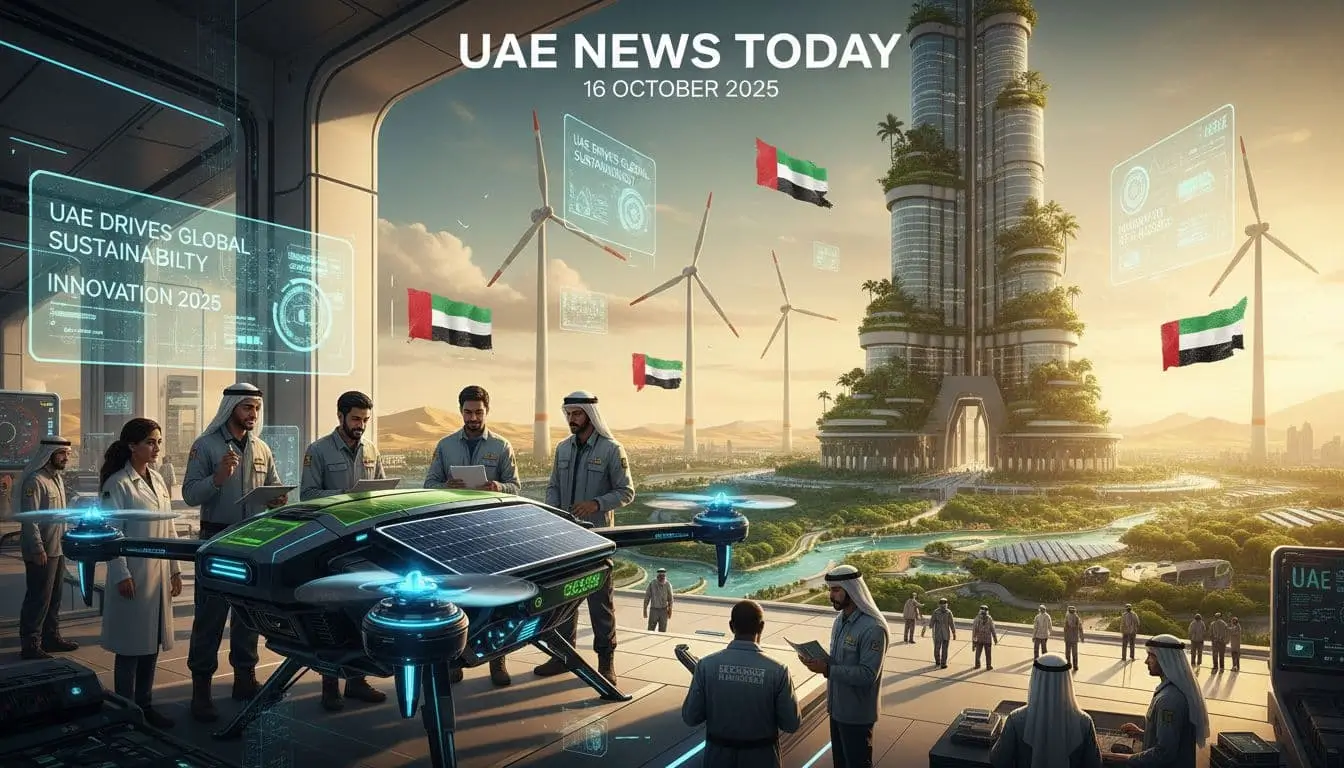UAE News Today – 16th October 2025
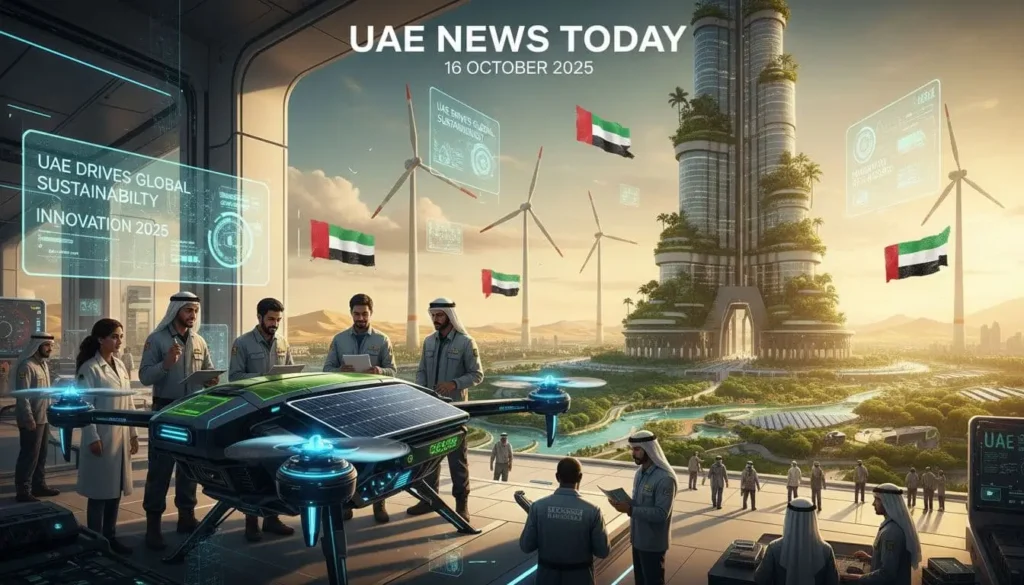
Innovation and sustainability set this week’s UAE agenda.
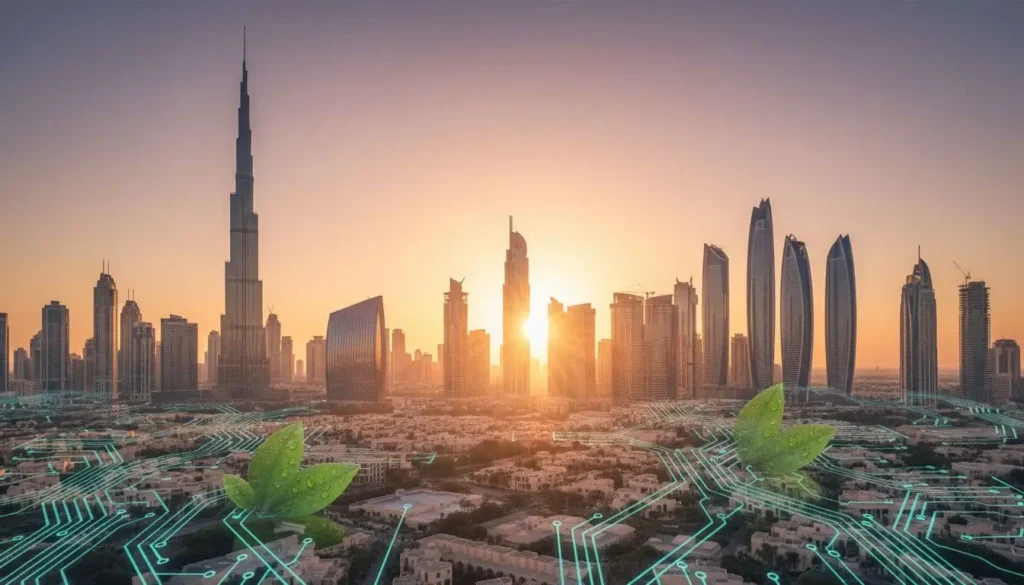
🎧 Listen to the Audio Version
Prefer to listen? Here’s today’s UAEThrive audio roundup.
Introduction
Today’s UAE roundup brings clear, useful updates for residents, investors, and visitors. You will find leadership diplomacy shaping skills and investment, GITEX Global 2025 as the anchor for large tech deals, and practical AI upgrades across public services. Climate action also moved forward with a new national MRV system and fresh conservation steps. On the business side, the UAE advanced logistics and industrial plans, while culture milestones and travel data point to strong community momentum. We end with today’s Dubai gold price sitting near AED 509 per gram for 24K. In each section, you will find quick actions you can take now, from tracking tenders and skilling programmes to pre-booking meetings and budgeting tips. Stay informed with the stories shaping the Emirates—and join the conversation. Which news item matters most to you? 💬 Share your thoughts in the comments below.
Leadership and national vision: UAE news today, 16th October 2025
Dubai’s creative economy push: Sheikha Latifa meets WEF to grow skills and startups
Dubai’s creative sector is moving into a new growth phase. Sheikha Latifa’s meeting with the World Economic Forum sets up targeted support for creative-media, gaming, and immersive content. Expect cross-border mentorship, knowledge exchange, and better access to investors. For founders, this can mean accelerator cohorts that blend industry mentors with policy support. For students and freelancers, it can mean new training tracks and practical placements tied to real projects.
Action: Watch for WEF-linked accelerator announcements and grant calls, then prepare a one-page portfolio and a simple milestone plan to apply fast.
UAE–Türkiye ties deepen: investment, defence, and logistics opportunities
High-level talks with Türkiye point to deeper cooperation in defence-tech, ports, and supply chains. This could expand joint procurement, co-development, and maintenance hubs. Freight corridors and maritime links may see upgrades as both sides seek resilient trade routes. For local firms in defence and logistics, this opens a wider market, with scope to partner with Turkish integrators and component suppliers.
Tip: SMEs should register on official tender portals and join bilateral business forums to spot early notices and supplier shortlists.
Climate leadership in action: USD 10m pledge and new protected areas
The UAE pledged USD 10 million to support climate-resilient communities in Asia-Pacific and moved to expand Abu Dhabi’s protected areas. This strengthens the country’s leadership in climate diplomacy. It also brings opportunities in conservation technology, biodiversity monitoring, and finance for nature-based solutions. Investors can look at blended finance models and impact funds. Startups should track calls for pilots in remote sensing, habitat restoration, and eco-tourism services aligned with conservation plans.
Quick tip: Map your product to measurable biodiversity outcomes and SDG targets to improve eligibility for green finance.
Ras Al Khaimah looks to Finland for green tech and advanced manufacturing
RAK’s engagement with Finland signals collaboration in clean industry, recycling, and high-value manufacturing. Nordic partners bring strengths in energy efficiency, circular economy materials, and precision engineering. Local clusters in ceramics, building materials, and machinery can plug into joint R&D and pilot lines, improving export readiness and compliance with global standards.
Action: Industrial players should draft concise capability statements highlighting certifications, capacity, and IP status to bring to joint innovation forums.
Innovation, AI, and GITEX Global 2025 highlights

GITEX Global is the region’s anchor marketplace for tech deals. AI and digital infrastructure matter now because they cut costs, scale services, and open new revenue lines. The UAE is moving fast: ministries and state groups are partnering on AI skills, cloud scale, and cyber defence. GITEX Global remains the region’s anchor marketplace where government, investors, and startups sign deals and showcase solutions. If you want pilots, customers, or capital, this is the moment to organise your pipeline, book meetings, and come with a clear ask.
- See the official GITEX 2025 recap for headline figures and themes: GITEX Global 2025 overview.
- For public-sector digital updates and infrastructure moves, review this UAE climate policy and systems page for context on measurable frameworks.
AI skills and cloud scale-up: Ministry of Investment teams with Microsoft
The Ministry of Investment’s cooperation with Microsoft is set to boost SME digitalisation, AI readiness, and local cloud capacity. Expect skilling tracks for AI fundamentals, data literacy, and responsible AI. SMEs should see easier onboarding to cloud services, access to sandbox tools, and co-sell opportunities once solutions mature. This will help founders modernise operations, cut manual work, and deploy AI assistants for support, sales, and finance.
Action for SMEs: Enrol staff in entry-level AI courses this month, adopt a single cloud environment for core apps, and nominate one internal AI champion to drive pilots.
Cyber defence upgrade: EDGE launches AI-driven threat detection
EDGE’s new AI-driven platform combines threat intelligence with scalable SOC integration. With attacks rising across sectors, this helps security teams detect anomalies faster and respond with playbooks. The system supports complex environments with varying data streams, which is vital for national infrastructure and corporates running multi-cloud networks.
CISO tip: Map your controls to national cyber frameworks, then stage tabletop exercises that test detection-to-response within set SLAs. Update vendor risk scoring to include AI model governance.
Smarter public services: pensions, courts, finance, and land go digital
Public services are getting faster and clearer. GPSSA and Core42 are using AI to improve pension processes, cutting backlogs and improving service quality. Abu Dhabi Judicial Department’s e-filing and remote hearings save time and travel costs for law firms and citizens. Integration between finance and land systems reduces rework and improves auditability, which speeds up real estate transactions and payments.
Action: Legal and real estate professionals should create client guides for e-filing and remote hearings, and set internal checklists for digital submissions to cut errors.
GITEX Global 2025 at a glance: 6,800+ exhibitors, AI, smart cities, and defence-tech
- Sheikh Mohammed set a direction to grow Dubai’s digital economy to AED 100 billion by 2033.
- Sheikh Hamdan discussed AI and fintech sandbox opportunities with Indian unicorn founders.
- Sheikh Mansoor toured defence-tech and autonomous systems, underlining security innovation.
- Sheikha Latifa spotlighted creative-media startups, with gaming and immersive content as export drivers.
- RAK’s delegation focused on smart government and cybersecurity for better citizen services.
- Context: Tabreed closed major district cooling deals that backstop urban growth and resilience.
- Context: MGX outlined sovereign AI compute plans to meet fast-rising regional AI demand.
Practical tip: Pre-book meetings through official GITEX channels and share a one-page agenda with each target. Ask for a 15-minute slot, then follow up with a short capability deck and a clear pilot proposal.
Sustainability and environment: climate action you can track
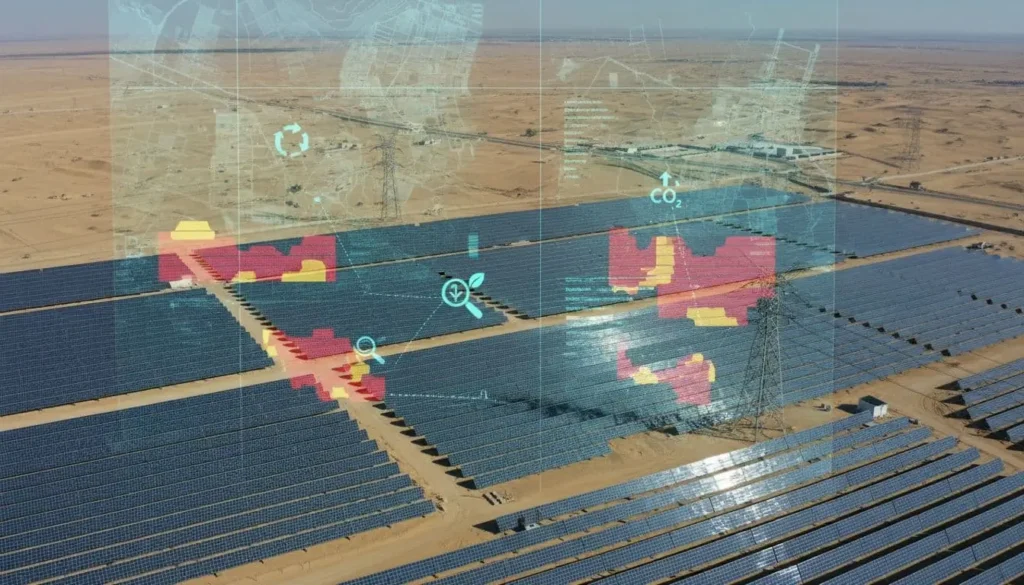
Data-driven climate action supports faster decarbonisation. Climate action is moving from plans to measurable systems. The UAE’s national MRV platform will standardise and speed emissions reporting, which helps unlock climate finance and gives companies a common data language. Youth and community programmes are scaling conservation skills on the ground. Food security work is channelled into drought-resistant crops and smart farming. Space-backed energy monitoring adds transparency to decarbonisation, which matters as global CO₂ levels keep rising.
National MRV system launches to track emissions faster
The new national MRV system reduces reporting cycles from 15 months to 3. That means faster disclosure, better benchmarking, and earlier access to green finance. It also lowers the cost of compliance by standardising templates and automating checks. What companies need: Facility-level energy data, fuel usage, refrigerant logs, process emissions, and activity data tied to recognised emission factors. Set up a monthly data capture routine now so quarter-end reports are clean.
Biodiversity and youth action: EAD partnerships, Majra, and Emirates Nature–WWF
The Environment Agency – Abu Dhabi is expanding partnerships that protect biodiversity and support climate adaptation. Majra and Emirates Nature–WWF have launched a youth programme with mentorship and fieldwork. Participants gain practical skills in species monitoring, habitat restoration, and community engagement. This builds a pipeline of talent aligned with national conservation goals and provides organisations with trained volunteers and junior specialists.
Tip: Students should track application windows, prepare a 2-page CV focused on field skills, and secure a short reference from a teacher or supervisor.
Food security and agri-tech: resilient crops and smart farming
Minister Amna Al Dahak outlined a push for climate-resilient agriculture. Priorities include drought-tolerant varieties, controlled-environment systems, and precision irrigation. This supports year-round yields with less water and creates room for agri-tech startups to pilot sensors, AI forecasting, and robotics. Investors can look at protected agriculture, desal-linked greenhouses, and waste-to-fertiliser solutions with measurable water savings.
Action for startups: Build a pilot budget for a small greenhouse zone, track litres-per-kilo metrics, and line up a local buyer to validate demand.
Energy insights from space: Abu Dhabi DoE and Space42 collaboration
Satellite monitoring will sharpen grid planning, detect losses, and validate renewable performance. For utilities and large campuses, this means better load forecasting and faster detection of inefficiencies. With global CO₂ levels rising, data-rich monitoring is essential to target abatement where it matters most and prove outcomes to lenders.
Quick note: Add satellite-derived insights to energy audits, then prioritise fixes with the fastest payback.
Business, culture, and market watch: UAE news today for investors and families
EV logistics capacity is scaling alongside industrial diversification. The UAE’s economy is adding capacity in logistics, tech funding, and free zone support, while families gain from cultural openings and better walkability. Air travel is rising, which supports tourism and retail. For founders, the funding mix is widening. For residents, more digital government and cultural access improves daily life. Below are the key moves to watch and the steps you can take now.
Startups and SMEs: IFZA expansion and a new Dubai Tech Fund
IFZA’s new international hub strengthens on-the-ground support, making it easier to launch and grow. Expect faster company setup, smoother bank introductions, and clearer guidance on compliance. The University of Dubai’s AED 100 million Dubai Tech Fund targets AI, cybersecurity, and smart-city startups, combining capital with mentorship and university links. This gives founders both early funding and access to talent and labs.
How to prepare your pitch:
- Define the problem in one sentence.
- Show a quantifiable ROI or user demand.
- Present a 12-month roadmap with two milestones.
- Share a 5-slide deck and a short demo.
- List 3 customer references or LOIs if available.
Industry and logistics: EV hub plans and a major investment merger
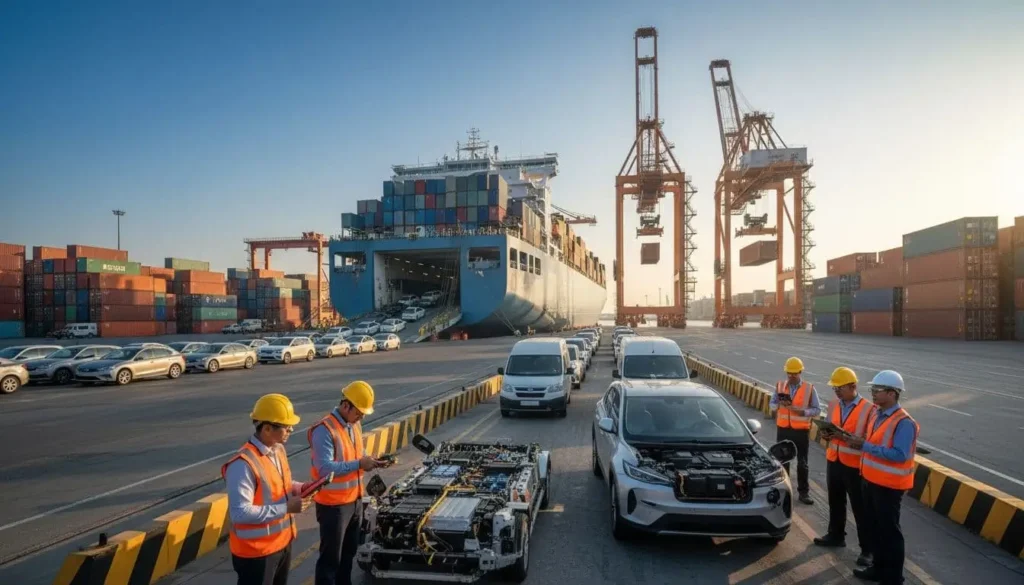
A new automotive logistics hub by ADIO, AD Ports Group, and Stellantis will focus on EVs and parts, with potential for localised assembly and distribution. This shores up regional supply chains and creates service jobs in maintenance and parts handling. IHC’s AED 120 billion merger with 2PointZero aims to create portfolio synergies across sectors, which could shift capital allocations and deepen market liquidity. For suppliers and contractors, both moves point to larger purchase orders and multi-year frameworks.
Tip: Suppliers should pre-qualify with AD Ports and automotive partners, and map capabilities to EV-specific standards, including battery handling and safety training.
Culture and community: museum opening, Arabic library, and a walkable neighbourhood
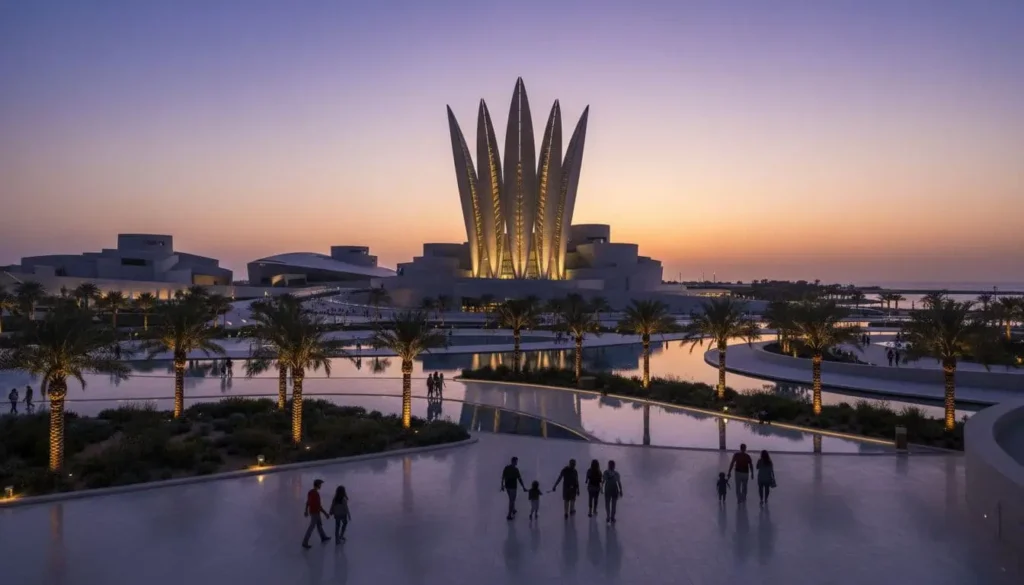
- Zayed National Museum opens in December on Saadiyat Island, cementing Abu Dhabi’s cultural district and celebrating Sheikh Zayed’s legacy. This will boost tourism and open education pathways, from school visits to research residencies.
- Abu Dhabi Arabic Language Centre’s digital library expands access to literature, which helps students and lifelong learners.
- Sharjah’s first fully walkable neighbourhood promotes health and safety, with shaded routes and community facilities.
- Also in the positive column: a Watts Water innovation award with Khalifa University highlights practical water savings, while UAE Team Emirates marked its 95th win of the season, a morale boost for local sport.
Action: Families can plan a day trip to Saadiyat’s cultural venues; urban planners can study Sharjah’s walkability design features for future projects.
Travel and prices: air traffic growth and today’s Dubai gold rate
Air passenger traffic is forecast to reach about 155 million this year, supporting airlines, retail, and hospitality. For travellers, this means busy peak periods and strong route networks. Meanwhile, Dubai’s 24K gold price is stabilising around AED 509 per gram on 16 October, a useful benchmark for buyers during festival season.
Practical tips:
- Travel: Book 4–6 weeks ahead for popular routes, and use mid-week flights to save.
- Gold: Set a target price per gram, compare across two or three trusted stores, and time purchases during intraday dips.
Conclusion
Today’s UAE news shows signal trends holding steady: the creative economy is getting new skills and startup support, AI adoption is reshaping public and private services, climate transparency is accelerating through a national MRV system and biodiversity programmes, and bold logistics and cultural projects are expanding the country’s capacity and quality of life. For businesses, this is the time to position for partnerships, grants, and pilots that align with national priorities. For residents, digital services, cultural openings, and better mobility bring real benefits week by week.
Two quick actions:
- For business readers: Shortlist one partnership to pursue this month, then draft a 1-page pilot plan with KPIs and a clear budget.
- For residents: Create accounts on the new digital portals you use most, and save time by switching to e-filing and remote services where available.
Sources
- GITEX Global 2025 overview, GITEX, October 2025
- National climate policy and MRV framework, UAE Government Portal, October 2025
- District cooling expansion, Tabreed press newsroom, October 2025
- UAE investment cooperation updates, UAE Ministry of Investment, October 2025
- Public service digitisation, Abu Dhabi Judicial Department, October 2025
UAE Market Insights
Get the latest data on sectors trending in the Emirates and align your next move with real-time demand.
Explore InsightsFree Business Listing
Add your company to UAE Thrive’s directory and get discovered by local customers at zero cost.
List for FreePremium Visibility
Upgrade to a featured profile and stand out in search results with priority placement and rich media.
Go PremiumGrowth Strategy Call
Book a free 15-minute consultation and receive tailored advice on scaling your UAE business faster.
Schedule Call